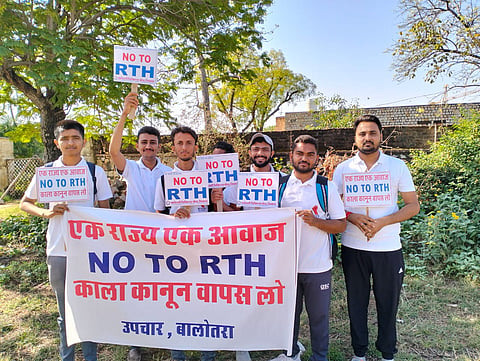
After days of rigorous protests by private doctors in Rajasthan over the Right to Health (RTH) Act, a consensus was finally reached on Tuesday. The state government has reportedly agreed to exclude private hospitals from the ambit of the RTH act, that have not benefited from land or other resources provided by the government. The talks involved a delegation of doctors, including representatives from the Indian Medical Association (IMA), Private Hospitals and Nursing Homes Society (PHNS), and United Private Clinics and Hospitals Association of Rajasthan (UPCHAR), among others.
The delegation signed an agreement consisting of eight points. T. Ravikanth, Principal Secretary, Medical Education signed the MoU on behalf of the state government. With the consensus reached, the fortnight-long agitation by the private doctors has been called off, and the medical services that had remained crippled during that time have returned to normalcy. Chief Minister affirmed the consensus between the government and the striking doctors, "I am happy that finally an agreement has been reached between the government and the doctors on Right to Health and Rajasthan has become the first state in the country to implement it," Ashok Gehlot said on Twitter. He further added, “I hope that the doctor-patient relationship will remain the same in future as well".
Rajasthan boasts a sizable healthcare industry, with nearly 10,000 private healthcare facilities and around 50,000 doctors calling the state home.
Due to the closure of private hospitals and diagnostic laboratories, government hospitals in Rajasthan were overwhelmed with patients, leading to long waiting times and a shortage of available beds. Many patients reportedly faced difficulties to get admitted to government hospitals due to the high demand. As a result, even basic healthcare services such as X-rays had become harder to access.
As per reports from news agency PTI, the Private Hospitals and Nursing Homes Society has planned to end its protests against the Right to Health Act (RTH) in Rajasthan after successful negotiations with the state government. The society has decided to call off the protests formally and organize a general body meeting to do so.
Sunil Chugh, President of the Indian Medical Association in Rajasthan, also expressed his support for ending the protests, stating to the media that 98% of private hospitals had withdrawn from the protests, and there was no reason to continue the agitation.
Rajasthan is the first state in India to extend comprehensive healthcare facilities to the entire resident population through its Right to Health Act. This act guarantees every resident access to free-of-cost healthcare services, including emergency treatment without prepayment, at any healthcare institution in the state.
According to the bill, people with rare diseases, for which treatments are costly and difficult to access, would be covered by the state. This would ensure that such individuals could not be denied treatment as it would become their right. This new legislation is a significant step forward, as until now, no state or central government in India has been able to achieve this.
Since the proposal on RTH was known, the majority of doctors had been demanding that private hospitals that have not availed themselves of government benefits in the form of land or buildings should be kept out of the scope of the Bill. Their concern was that the Bill would place the burden of responsibility for providing healthcare services to citizens on the shoulders of private hospitals and doctors, thereby regressing private healthcare standards to those of public healthcare.
Despite their concerns, the State government passed the RTH Bill in the Assembly through a voice vote on 21st March, thereby becoming the first state in the country to implement such legislation. On the other hand, the continued protests by medical professionals highlighted the need for all stakeholders, including medical professionals, to be involved in healthcare reform initiatives. However, since the passage of the bill, doctors launched a statewide protest against it.
Despite the protests from doctors, the Rajasthan government refused to take back the bill. Chief Minister Ashok Gehlot blamed an "RSS-linked lobby" for misguiding protesting doctors in Rajasthan. The government emphasized that the new law aimed to provide comprehensive healthcare to all residents of Rajasthan, irrespective of their socio-economic status.
However, doctors continued to express concerns about the potential bureaucratic interference in the functioning of private hospitals and the impact on the quality of healthcare services. The standoff continued between the state government and doctors, which badly affected the patients who suffered immensely lacking timely medical care.
An agreement was reached between the government and private hospitals on Tuesday morning. As per the agreement, private multi-speciality hospitals with less than 50 beds have been excluded from RTH. Additionally, private hospitals established without taking any facilities from the government in the form of land and building at a subsidised rate will also be excluded from the RTH Act.
The RTH Act will include four categories of hospitals: private medical college hospitals, hospitals established on the PPP mode, hospitals established after taking land from the government free of cost or on subsidised rates, and hospitals run by trusts funded by the government in the form of land and building.
The agreement also includes the withdrawal of police cases and other cases registered during the protests against the RTH Act. Moreover, the renewal of the fire No Objection Certificate (NOC) for hospitals will be done every five years and any further change in rules will be made after consultation with two representatives of IMA as per the agreement.
You can also join our WhatsApp group to get premium and selected news of The Mooknayak on WhatsApp. Click here to join the WhatsApp group.